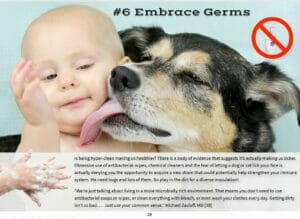 Our bodies contain around eight million genes. Yet only about 0.3 percent are human. The rest come from your microbiome — the sum total of genes from the numerous microbes (mostly bacteria, but also viruses, yeasts and fungi) that coat your skin, mouths, gut lining – just about everything.
Our bodies contain around eight million genes. Yet only about 0.3 percent are human. The rest come from your microbiome — the sum total of genes from the numerous microbes (mostly bacteria, but also viruses, yeasts and fungi) that coat your skin, mouths, gut lining – just about everything.
And any number of lifestyle factors can influence your microbiome, things like diet, antibiotic use and even the people we live with.
While a person might only have 10 percent of their microbiomes in common with a random stranger, people who live together share more microbial populations in common.
Research has even shown that you and your dog share similar microbial populations and UCSF scientists who conducted a study in 2013 suggested that living with a dog in infancy may lower a child’s risk of developing asthma and allergies, largely as a result of exposure to what they call “dog-associated house-dust”.
“The idea of combining animal, human and environmental health, and seeing the whole picture through the lens of the microbes that we share, is an increasing direction for research,” Knight said in a recent interview with U-T San Diego.
Reference
Fikes, B. Dog germs may be good for you. The San Diego Union-Tribune. 2015.
Havstad, S., Ganesa Wegienka, Edward M Zoratti, et al. Effect of Prenatal Indoor Pet Exposure on the Trajectory of Total IgE Levels in Early Childhood. The Journal of Allergy and Clinical Immunology. 2011: 128(4). Elsevier Ltd: 880–885.e4. doi: 10.1016/j.jaci.2011.06.039.
Tse, I. 7 Surprising Health Benefits of Dog Ownership. LiveScience. 2012




























